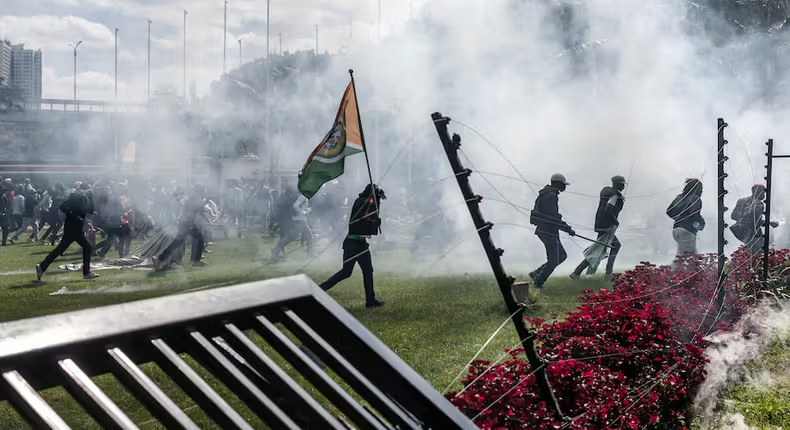Chaos erupted in Kenya on Tuesday as a part of the parliament building was set ablaze amidst large-scale protests against a new finance bill. Thousands of demonstrators, angry over the proposed taxes, stormed the parliament complex, forcing legislators to flee. This marks one of the most direct assaults on the Kenyan government in decades.
Journalists reported seeing at least three bodies outside the parliament complex after police opened fire on the protesters. The unrest quickly spread to other cities, reflecting deep-seated frustrations over the high cost of living in East Africa’s economic hub.
Protesters, primarily young people who had supported President William Ruto’s election with hopes for economic relief, demanded that lawmakers reject the new taxes. However, the bill was passed, leading to intense clashes. Opposition legislators who voted against the bill were allowed to leave the building, while those supporting it had to escape through a tunnel. The fire within the parliament was eventually extinguished.
One of the deceased protesters was seen wrapped in a Kenyan flag and carried away. The government has yet to comment on the incident, and internet service across the country has noticeably slowed. President Ruto, who was attending an African Union retreat outside Nairobi, is expected to sign the bill into law within two weeks.
The turmoil also affected the Nairobi governor’s office, which caught fire briefly. Smoke billowed from the building’s facade before police used water cannons to put out the flames. Protesters could be heard shouting, “We’re coming for every politician.”
Police responded with live ammunition and tear gas, targeting protesters seeking medical aid at a nearby church. Kenyatta National Hospital reported receiving 45 injured individuals, though it remains unclear if there were any fatalities.
The Kenya Human Rights Commission shared footage of police shooting at protesters, calling for accountability and urging President Ruto to immediately halt the violence. On Sunday, Ruto had attempted to quell tensions by praising the young protesters for exercising their democratic rights and promising to address their concerns.
Despite these assurances, the youth announced plans to hold the government accountable as prices for fuel, food, and other essentials continue to soar. Nairobi, a regional hub with significant expatriate and UN presence, has seen increasing inequality and longstanding frustrations over state corruption come to the fore.
The finance bill has united a large segment of the population against it, transcending the tribal divisions that have historically plagued Kenya. Many supporters of Ruto now feel betrayed by his policies. “I fell for his lies. Now I’m out here regretting why I voted for him,” said Oscar Saina, a young protester.
The unrest was not confined to Nairobi. In the western city of Nakuru, protesters attempted to storm the State House, while clashes were reported in the lakeside city of Kisumu. Mombasa’s governor joined protesters in his city, expressing solidarity with their cause. In Embu, ruling party offices were set on fire, and police confronted demonstrators in the streets of Nyeri.
One media outlet, KTN, reported receiving threats from authorities to cease coverage. Meanwhile, Catholic bishops urged police to refrain from attacking protesters and implored the government to heed the public’s outcry over the “unwarranted” taxes, highlighting the widespread suffering of Kenyan families.
The protests followed similar unrest last week, which resulted in two deaths. Civil society groups have warned of a severe crackdown as tensions continue to escalate.

